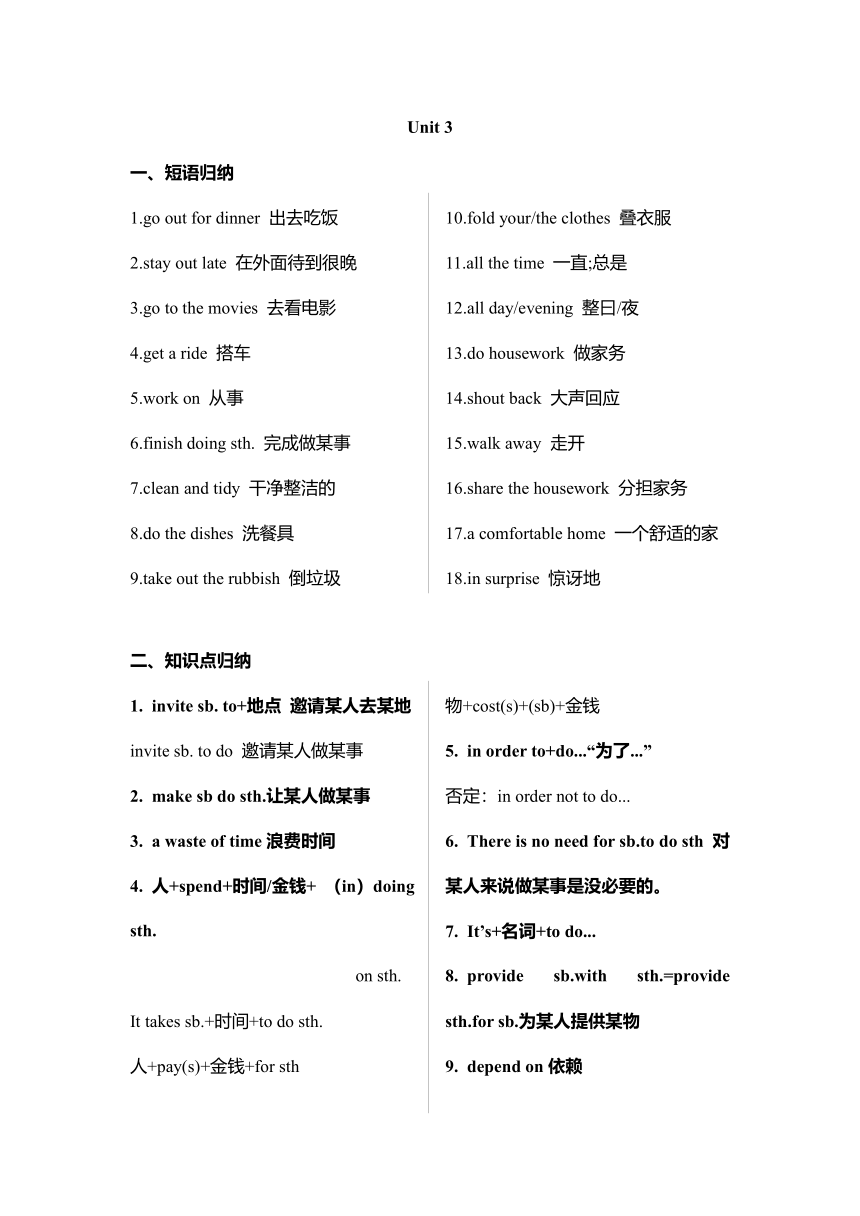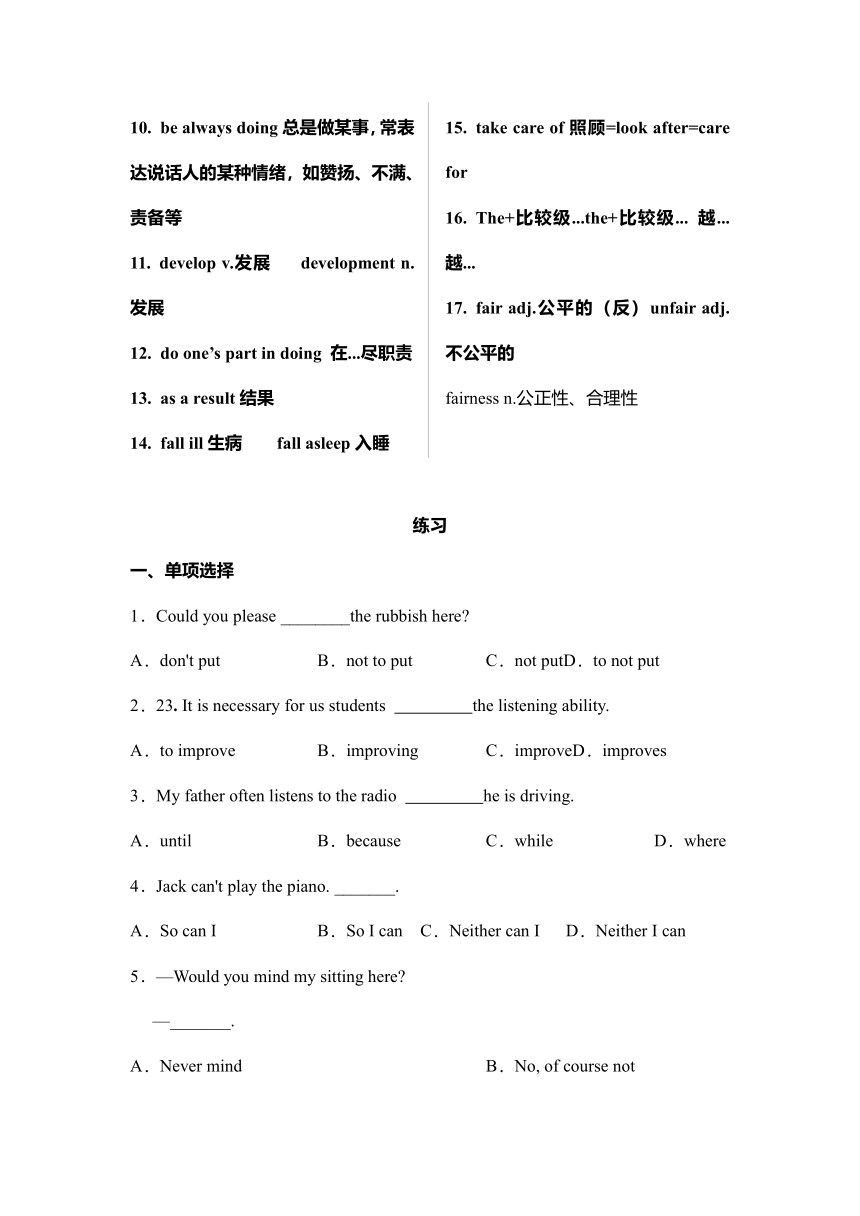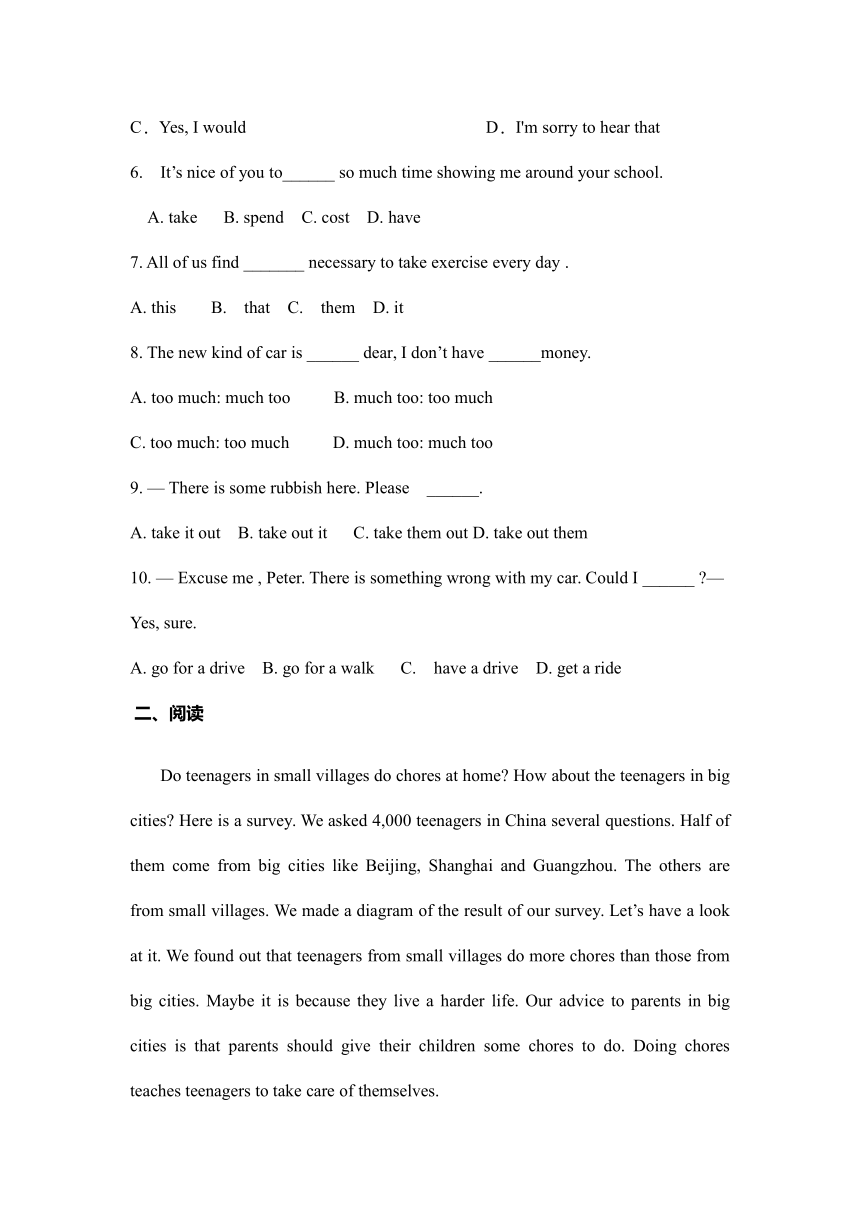Unit 3 Could you please clean your room?短语知识点归纳练习 2023-2024学年人教版英语八年级下册(无答案)
文档属性
| 名称 | Unit 3 Could you please clean your room?短语知识点归纳练习 2023-2024学年人教版英语八年级下册(无答案) |

|
|
| 格式 | docx | ||
| 文件大小 | 35.4KB | ||
| 资源类型 | 教案 | ||
| 版本资源 | 人教新目标(Go for it)版 | ||
| 科目 | 英语 | ||
| 更新时间 | 2024-03-23 00:00:00 | ||
图片预览



文档简介
Unit 3
一、短语归纳
1.go out for dinner 出去吃饭
2.stay out late 在外面待到很晚
3.go to the movies 去看电影
4.get a ride 搭车
5.work on 从事
6.finish doing sth. 完成做某事
7.clean and tidy 干净整洁的
8.do the dishes 洗餐具
9.take out the rubbish 倒垃圾
10.fold your/the clothes 叠衣服
11.all the time 一直;总是
12.all day/evening 整曰/夜
13.do housework 做家务
14.shout back 大声回应
15.walk away 走开
16.share the housework 分担家务
17.a comfortable home 一个舒适的家
18.in surprise 惊讶地
二、知识点归纳
invite sb. to+地点 邀请某人去某地
invite sb. to do 邀请某人做某事
make sb do sth.让某人做某事
a waste of time浪费时间
人+spend+时间/金钱+ (in)doing sth.
on sth.
It takes sb.+时间+to do sth.
人+pay(s)+金钱+for sth
物+cost(s)+(sb)+金钱
in order to+do...“为了...”
否定:in order not to do...
There is no need for sb.to do sth 对某人来说做某事是没必要的。
It’s+名词+to do...
provide sb.with sth.=provide sth.for sb.为某人提供某物
depend on依赖
be always doing总是做某事,常表达说话人的某种情绪,如赞扬、不满、责备等
develop v.发展 development n.发展
do one’s part in doing 在...尽职责
as a result结果
fall ill生病 fall asleep入睡
take care of照顾=look after=care for
The+比较级...the+比较级... 越...越...
fair adj.公平的(反)unfair adj.不公平的
fairness n.公正性、合理性
练习
一、单项选择
1.Could you please ________the rubbish here
A.don't put B.not to put C.not putD.to not put
2.23. It is necessary for us students the listening ability.
A.to improve B.improving C.improveD.improves
3.My father often listens to the radio he is driving.
A.until B.because C.while D.where
4.Jack can't play the piano. _______.
A.So can I B.So I can C.Neither can I D.Neither I can
5.—Would you mind my sitting here
—_______.
A.Never mind B.No, of course not
C.Yes, I would D.I'm sorry to hear that
6. It’s nice of you to______ so much time showing me around your school.
A. take B. spend C. cost D. have
7. All of us find _______ necessary to take exercise every day .
A. this B. that C. them D. it
8. The new kind of car is ______ dear, I don’t have ______money.
A. too much: much too B. much too: too much
C. too much: too much D. much too: much too
9. — There is some rubbish here. Please ______.
A. take it out B. take out it C. take them out D. take out them
10. — Excuse me , Peter. There is something wrong with my car. Could I ______ — Yes, sure.
A. go for a drive B. go for a walk C. have a drive D. get a ride
二、阅读
Do teenagers in small villages do chores at home How about the teenagers in big cities Here is a survey. We asked 4,000 teenagers in China several questions. Half of them come from big cities like Beijing, Shanghai and Guangzhou. The others are from small villages. We made a diagram of the result of our survey. Let’s have a look at it. We found out that teenagers from small villages do more chores than those from big cities. Maybe it is because they live a harder life. Our advice to parents in big cities is that parents should give their children some chores to do. Doing chores teaches teenagers to take care of themselves.
1.They surveyed ______ teenagers from small villages.
A.1,000 B.2,000 C.3,000 D.4,000
2.There are 1,000 teenagers from the cities who ______.
A.take out the trash
B.do the dishes
C.make the bed
D.fold the clothes
3.Fewer than ______ teenagers in big cities sweep the floor and make the bed.
A.500 B.1,000 C.1,500 D.2,000
4.The number of teenagers ______ in big cities is bigger than that in small villages.
A.making the bed
B.taking out the trash
C.folding the clothes
D.doing the dishes
5.Why did they make the survey
A.Because they don’t want teenagers in China to do chores at home.
B.Because they thought it will help teenagers to take good care of themselves to do chores.
C.Because they wanted to know if teenagers in China do chores at home.
D.Because they thought it is not necessary for teenagers to look after themselves.
三、用所给词的适当形式填空
1. The teacher often tells us not _____________ (not surf) the Internet.
2. Come on! I have something important to _____________ (tell) you.
3. I haven’t decided when to _____________ (take) a holiday yet.
4. To _____________ (be) healthy, we should eat more vegetables and fruits.
5. My job is to _____________ (study) hard.
6.It’s not enough for students to just get good ________ (grade) at school.
7.I’m trying to sleep. Would you mind ________ (turn) down the music
8.The fourth day of July is the National ________ (independent) Day of the US.
9.Doing chores can help children understand the idea of ________ (fair).
10.Our country is ________ (develop) very quickly now.
四、根据汉语意思完成句子
1.为了通过考试,他每天都努力学习。
______________________ pass the exam, he studies hard every day.
2.如果你努力学习,你会取得好的成绩。
You can ______________________ if you study hard.
3.你不应该完全依赖你的父母。
You shouldn’t ______________________ your parents completely.
4.他了解中国的历史越多,就越想住在这里。
______________________ he learns history about China, ______________________ he wants to live here.
5.我不想做家务,他也不想做。
I don’t want to do chores, ______________________.
6.一些青少年认为做家务是浪费时间。
Some teenagers believe doing chores is ____ _______ ______ ______.
7.你没有必要为他担心,他现在能照顾自己。
_______ _______ ______for you to worry about him. He can look after himself now.
8.做家务有助于发展孩子们的独立性,教会他们怎样照顾自己。
Doing chores helps to develop children’s independence and teaches them how to ________ _______ _______.
9.对学生来说仅仅取得好成绩是不够的。
_______ _______ ______to just get good grades at school.
10.孩子越早学会独立,对他们的未来就会更好。
_______ ________kids learn to be independent,______ ______it is for their future.
五、按要求完成下列句子
1.Could you please make your bed?(改为祈使句)
______ ________ _______,please.
2.Sun Min cleans her room every day.(改为否定句)
Sun Min ________ __________her room every day.
3.Could I go shopping with you?(作否定回答)
__________,_________ _________.
4.I have a test on Monday.(对画线部分提问)
__________ ________you have a test
5.They're going to buy some drinks and snacks this afternoon.(对画线部分提问)
__________ ________they going to buy this afternoon
一、短语归纳
1.go out for dinner 出去吃饭
2.stay out late 在外面待到很晚
3.go to the movies 去看电影
4.get a ride 搭车
5.work on 从事
6.finish doing sth. 完成做某事
7.clean and tidy 干净整洁的
8.do the dishes 洗餐具
9.take out the rubbish 倒垃圾
10.fold your/the clothes 叠衣服
11.all the time 一直;总是
12.all day/evening 整曰/夜
13.do housework 做家务
14.shout back 大声回应
15.walk away 走开
16.share the housework 分担家务
17.a comfortable home 一个舒适的家
18.in surprise 惊讶地
二、知识点归纳
invite sb. to+地点 邀请某人去某地
invite sb. to do 邀请某人做某事
make sb do sth.让某人做某事
a waste of time浪费时间
人+spend+时间/金钱+ (in)doing sth.
on sth.
It takes sb.+时间+to do sth.
人+pay(s)+金钱+for sth
物+cost(s)+(sb)+金钱
in order to+do...“为了...”
否定:in order not to do...
There is no need for sb.to do sth 对某人来说做某事是没必要的。
It’s+名词+to do...
provide sb.with sth.=provide sth.for sb.为某人提供某物
depend on依赖
be always doing总是做某事,常表达说话人的某种情绪,如赞扬、不满、责备等
develop v.发展 development n.发展
do one’s part in doing 在...尽职责
as a result结果
fall ill生病 fall asleep入睡
take care of照顾=look after=care for
The+比较级...the+比较级... 越...越...
fair adj.公平的(反)unfair adj.不公平的
fairness n.公正性、合理性
练习
一、单项选择
1.Could you please ________the rubbish here
A.don't put B.not to put C.not putD.to not put
2.23. It is necessary for us students the listening ability.
A.to improve B.improving C.improveD.improves
3.My father often listens to the radio he is driving.
A.until B.because C.while D.where
4.Jack can't play the piano. _______.
A.So can I B.So I can C.Neither can I D.Neither I can
5.—Would you mind my sitting here
—_______.
A.Never mind B.No, of course not
C.Yes, I would D.I'm sorry to hear that
6. It’s nice of you to______ so much time showing me around your school.
A. take B. spend C. cost D. have
7. All of us find _______ necessary to take exercise every day .
A. this B. that C. them D. it
8. The new kind of car is ______ dear, I don’t have ______money.
A. too much: much too B. much too: too much
C. too much: too much D. much too: much too
9. — There is some rubbish here. Please ______.
A. take it out B. take out it C. take them out D. take out them
10. — Excuse me , Peter. There is something wrong with my car. Could I ______ — Yes, sure.
A. go for a drive B. go for a walk C. have a drive D. get a ride
二、阅读
Do teenagers in small villages do chores at home How about the teenagers in big cities Here is a survey. We asked 4,000 teenagers in China several questions. Half of them come from big cities like Beijing, Shanghai and Guangzhou. The others are from small villages. We made a diagram of the result of our survey. Let’s have a look at it. We found out that teenagers from small villages do more chores than those from big cities. Maybe it is because they live a harder life. Our advice to parents in big cities is that parents should give their children some chores to do. Doing chores teaches teenagers to take care of themselves.
1.They surveyed ______ teenagers from small villages.
A.1,000 B.2,000 C.3,000 D.4,000
2.There are 1,000 teenagers from the cities who ______.
A.take out the trash
B.do the dishes
C.make the bed
D.fold the clothes
3.Fewer than ______ teenagers in big cities sweep the floor and make the bed.
A.500 B.1,000 C.1,500 D.2,000
4.The number of teenagers ______ in big cities is bigger than that in small villages.
A.making the bed
B.taking out the trash
C.folding the clothes
D.doing the dishes
5.Why did they make the survey
A.Because they don’t want teenagers in China to do chores at home.
B.Because they thought it will help teenagers to take good care of themselves to do chores.
C.Because they wanted to know if teenagers in China do chores at home.
D.Because they thought it is not necessary for teenagers to look after themselves.
三、用所给词的适当形式填空
1. The teacher often tells us not _____________ (not surf) the Internet.
2. Come on! I have something important to _____________ (tell) you.
3. I haven’t decided when to _____________ (take) a holiday yet.
4. To _____________ (be) healthy, we should eat more vegetables and fruits.
5. My job is to _____________ (study) hard.
6.It’s not enough for students to just get good ________ (grade) at school.
7.I’m trying to sleep. Would you mind ________ (turn) down the music
8.The fourth day of July is the National ________ (independent) Day of the US.
9.Doing chores can help children understand the idea of ________ (fair).
10.Our country is ________ (develop) very quickly now.
四、根据汉语意思完成句子
1.为了通过考试,他每天都努力学习。
______________________ pass the exam, he studies hard every day.
2.如果你努力学习,你会取得好的成绩。
You can ______________________ if you study hard.
3.你不应该完全依赖你的父母。
You shouldn’t ______________________ your parents completely.
4.他了解中国的历史越多,就越想住在这里。
______________________ he learns history about China, ______________________ he wants to live here.
5.我不想做家务,他也不想做。
I don’t want to do chores, ______________________.
6.一些青少年认为做家务是浪费时间。
Some teenagers believe doing chores is ____ _______ ______ ______.
7.你没有必要为他担心,他现在能照顾自己。
_______ _______ ______for you to worry about him. He can look after himself now.
8.做家务有助于发展孩子们的独立性,教会他们怎样照顾自己。
Doing chores helps to develop children’s independence and teaches them how to ________ _______ _______.
9.对学生来说仅仅取得好成绩是不够的。
_______ _______ ______to just get good grades at school.
10.孩子越早学会独立,对他们的未来就会更好。
_______ ________kids learn to be independent,______ ______it is for their future.
五、按要求完成下列句子
1.Could you please make your bed?(改为祈使句)
______ ________ _______,please.
2.Sun Min cleans her room every day.(改为否定句)
Sun Min ________ __________her room every day.
3.Could I go shopping with you?(作否定回答)
__________,_________ _________.
4.I have a test on Monday.(对画线部分提问)
__________ ________you have a test
5.They're going to buy some drinks and snacks this afternoon.(对画线部分提问)
__________ ________they going to buy this afternoon
同课章节目录
- Unit 1 What's the matter?
- Section A
- Section B
- Unit 2 I'll help to clean up the city parks.
- Section A
- Section B
- Unit 3 Could you please clean your room?
- Section A
- Section B
- Unit 4 Why don't you talk to your parents?
- Section A
- Section B
- Unit 5 What were you doing when the rainstorm came
- Section A
- Section B
- Review of Units 1-5
- Unit 6 An old man tried to move the mountains.
- Section A
- Section B
- Unit 7 What's the highest mountain in the world?
- Section A
- Section B
- Unit 8 Have you read Treasure Island yet?
- Section A
- Section B
- Unit 9 Have you ever been to a museum?
- Section A
- Section B
- Unit 10 I've had this bike for three years.
- Section A
- Section B
